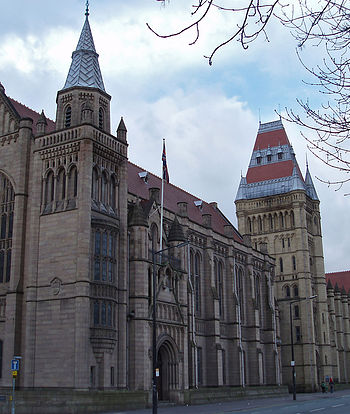 The University of Manchester has a complete range of professional subjects and comprehensive facilities. It is centrally located and the buildings of the main site are integrated into the fabric of Manchester, with non-university buildings and major roads between them. The large campus buildings of the University of Manchester are the largest in Western Europe. It includes: The main campus of the University of Manchester, School of Medicine, School of Chemical Engineering and Analytical Science, School of Music (part of the University of Manchester), Manchester Business School and School of Computer Science.
The University of Manchester has a complete range of professional subjects and comprehensive facilities. It is centrally located and the buildings of the main site are integrated into the fabric of Manchester, with non-university buildings and major roads between them. The large campus buildings of the University of Manchester are the largest in Western Europe. It includes: The main campus of the University of Manchester, School of Medicine, School of Chemical Engineering and Analytical Science, School of Music (part of the University of Manchester), Manchester Business School and School of Computer Science.
The University of Manchester is formerly known as Owens College, which was established in 1851, granted a Royal Charter in 1880 and renamed the Victoria University of Manchester in 1903. In 2004, it formally merged with the University of Manchester Institute of Science and Technology (established in 1824) and became the University of Manchester. The university is famous for its rigorous academic atmosphere, innovative teaching and academic research.
The university currently has a total of 18,000 students from the UK and the rest of the world, including about 2,500 overseas students from more than 120 overseas countries. The university employs 3,000 teaching staff. Many of them are world-renowned scientists.
University of Manchester Teaching Profile
The University of Manchester is famous for its teaching, academics and innovation. For over a century, the university’s students, teaching and research staff have produced over 20 Nobel Prize winners. Many key scientific and technological research results in last century are from the university (such as aircraft engine development, first isolated atoms, and the world’s first computer invention). Its overall teaching quality assessment is always ranked one of the top 20 universities in the UK.
The University of Manchester is one of the British redbrick universities. The world’s first computer was invented here in 1948. The university is reputable in the following subject areas: Business, Computers and Engineering. It is a comprehensive university. Undergraduate and master’s programmes involve all aspects of the Arts and Sciences. Among them, Business, Machinery Manufacturing, Aerospace, Computers, Law and Urban Planning are the most famous subjects. Management, Computers, Law and Mechanical engineering were rated “excellent”. Business research ranked No. 7, Computers ranked No. 8, Law ranked No. 3, Mechanical Engineering ranked No. 8 and Molecular Biology ranked No. 11 in the UK.
All the major facilities, libraries, the students’ union, and some dormitories are located on campus. The library has about 5 million volumes of books, journals, and other information, and is Britain’s third-largest library. All books are available through the online public access library catalogue system. All students can access free Internet and email through more than 6,000 terminals in the university. These terminals are on a network system in every faculty and library.
Faculties of the University of Manchester
The University of Manchester is divided into eight academic areas: The School of Arts, School of Education, School of Law, Manchester Business School, School of Medicine (including Dentistry and Nursing), School of Biological Sciences, School of Science and Engineering and the School of Economics and Social Studies.
Professional Courses
The University of Manchester offers a wide range and high level of bachelor’s, taught and research master’s courses. The university’s course quality is consistently in the UK’s top 10 university listings. Courses include Business Studies, Computing, Law, Theatre and Film, Music, and Mechanical Engineering.
The research level is also very high in Anthropology, Business Administration, Chemistry, Computer Science, Geography, Geology, Law, Mathematics, Statistics and Operations Research, Mechanical Engineering, Music, Physics and Astronomy, Psychology, Social Policy, Administration and Biology.
Popular Courses and Professional Strengths
Computers, Psychology, Physics, Earth Science, Theoretical Mathematics, Applied Mathematics, Civil Engineering, Urban Planning, Economics and Econometrics, Sociology, Business and Management Research, Accounting and Finance, Mechanical, Aerospace and Civil Engineering.
Study Costs
Literary Arts-based programmes: £8,300 per year
Science-based programmes: £10,750 per year
Clinical programmes: £19,450 per year
Living Costs
Self-catering accommodation is about £6,200 per year
Entry Requirements
Students must have turned 18 years of age at the beginning of the semester. The following conditions apply:
- Graduation from an excellent high school or equivalent, excellent academic grades, and supporting letters of recommendation
- Successful completion of a recognised foundation course with excellent academic grades
- IELTS score of 7, each individual component must be no less than 6 (with a writing score of 7); or a TOEFL score of 700 (or other equivalent English language proficiency test)
For students enrolling on taught graduate programmes, the minimum conditions are:
- Graduation from an excellent university with a bachelor’s degree, excellent academic grades, and supporting letters of recommendation
- IELTS score of 7 or TOEFL score of 700.
Scholarships
Scholarships are available for international students, but these are limited. Only outstanding students can apply.
